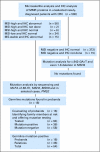Feasibility of screening for Lynch syndrome among patients with colorectal cancer
- PMID: 18809606
- PMCID: PMC2645108
- DOI: 10.1200/JCO.2008.17.5950
Feasibility of screening for Lynch syndrome among patients with colorectal cancer
Abstract
Purpose: Identifying individuals with Lynch syndrome (LS) is highly beneficial. However, it is unclear whether microsatellite instability (MSI) or immunohistochemistry (IHC) should be used as the screening test and whether screening should target all patients with colorectal cancer (CRC) or those in high-risk subgroups.
Patients and methods: MSI testing and IHC for the four mismatch repair proteins was performed on 500 tumors from unselected patients with CRC. If either MSI or IHC was abnormal, complete mutation analysis for the mismatch repair genes was performed.
Results: Among the 500 patients, 18 patients (3.6%) had LS. All 18 patients detected with LS (100%) had MSI-high tumors; 17 (94%) of 18 patients with LS were correctly predicted by IHC. Of the 18 probands, only eight patients (44%) were diagnosed at age younger than 50 years, and only 13 patients (72%) met the revised Bethesda guidelines. When these results were added to data on 1,066 previously studied patients, the entire study cohort (N = 1,566) showed an overall prevalence of 44 of 1,566 patients (2.8%; 95% CI, 2.1% to 3.8%) for LS. For each proband, on average, three additional family members carried MMR mutations.
Conclusion: One of every 35 patients with CRC has LS, and each has at least three relatives with LS; all of whom can benefit from increased cancer surveillance. For screening, IHC is almost equally sensitive as MSI, but IHC is more readily available and helps to direct gene testing. Limiting tumor analysis to patients who fulfill Bethesda criteria would fail to identify 28% (or one in four) cases of LS.
Figures
Comment in
-
Comprehensive screening for Lynch syndrome: who can be the driving force in daily clinical practice?J Clin Oncol. 2009 May 1;27(13):2292. doi: 10.1200/JCO.2009.22.0731. Epub 2009 Mar 23. J Clin Oncol. 2009. PMID: 19307489 No abstract available.
-
Molecular screening for Lynch syndrome: from bench to bedside.J Clin Oncol. 2009 Dec 1;27(34):e224; author reply e225. doi: 10.1200/JCO.2009.24.6744. Epub 2009 Oct 26. J Clin Oncol. 2009. PMID: 19858372 No abstract available.
References
-
- Society AC: Cancer Facts and Figures 2006. Atlanta, GA, American Cancer Society, 2006
-
- Lynch H, de la Chapelle A: Genomic medicine: Hereditary colon cancer. N Engl J Med 348:919-932, 2003 - PubMed
-
- Burke W, Petersen G, Lynch P, et al: Recommendations for follow-up care of individuals with an inherited predisposition to cancer: I. Hereditary nonpolyposis colon cancer—Cancer Genetics Studies Consortium. JAMA 277:915-919, 1997 - PubMed
-
- Lindor NM, Petersen GM, Hadley DW, et al: Recommendations for the care of individuals with an inherited predisposition to Lynch syndrome: A systematic review. JAMA 296:1507-1517, 2006 - PubMed
-
- Vasen HF, de Vos Tot Nederveen Cappel WH: An evidence-based review on surveillance for Lynch syndrome. Dis Colon Rectum 49:1797-1798, 2006; author reply 1799 - PubMed
Publication types
MeSH terms
Substances
Grants and funding
LinkOut - more resources
Full Text Sources
Other Literature Sources
Medical
Miscellaneous


